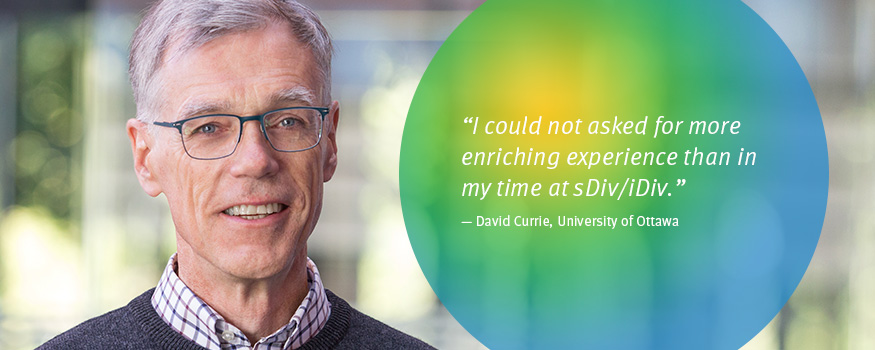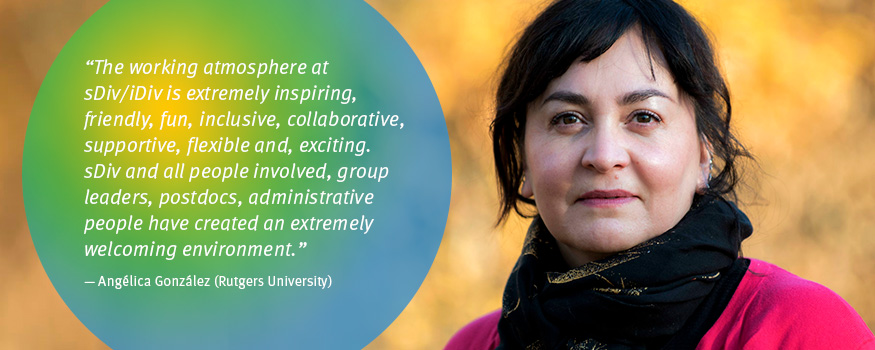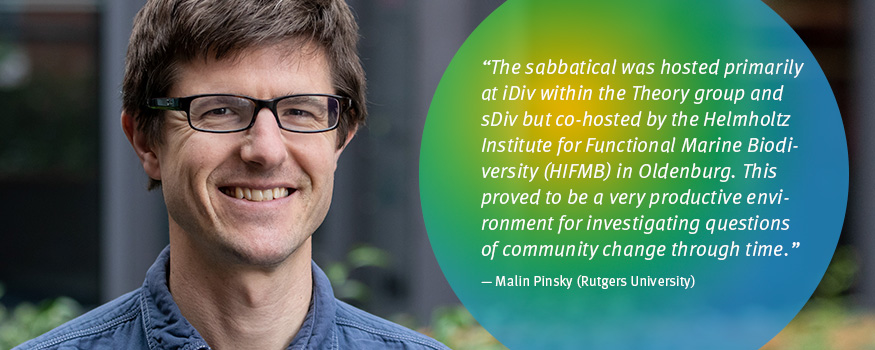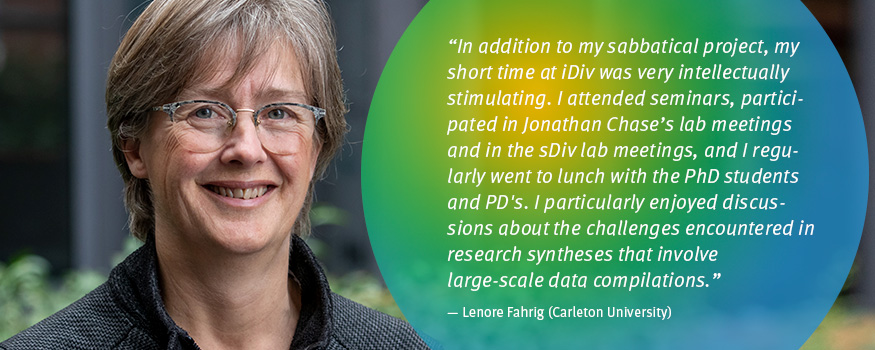Der Inhalt dieser Seite steht nur in englischer Sprache zur Verfügung.
iDiv Sabbaticals
Interactions and scientific involvement of iDiv visiting scientists are central mechanisms which contribute to iDiv’s mission to be a leading biodiversity research centre. iDiv sabbatical researchers play an important role in contributing to the iDiv mission through their intellectual and social interactions, in which they share their vision, experience and passion for biodiversity research.
iDiv Sabbatical Board
| Prof Aletta Bonn | Prof Jonathan Chase |
| Prof Stan Harpole (Chair) | Prof Tiffany Knight |
| Prof Ingolf Kühn | Dr Marten Winter |
Admin contact
Open call for proposals - deadline 30 November 2024
For Sabbatical projects running until December 2025.
- check the call description for more detailed information
- fill in the project proposal template
- add your personal information and upload your proposal to the iDiv application portal
- deadline for sumbission is 30 November 2024 (11:59 PM CET)
- final decisions will be announced in January 2025
Applications are accepted via the iDiv application portal only. Registration is required for being able to create your application. It is possible to save and change data at any time during the application process until the final submission. Please contact luise.dietel@idiv.de for any assistance.
Current iDiv Sabbatical Fellows
Past iDiv Sabbatical Fellows
Name (Affiliation) | Research project | Year | Report |
|---|---|---|---|
Priyanga Amarasekare (University of California Los Angeles) | A framework for biodiversity maintenance: scaling up from modules to communities | 2018 |
|
| Meghan Avolio (John Hopkins University) | Investigating the repeatability of global change field experiments | 2023 | |
Stephanie Bohlman (University of Florida) | Linking biodiversity and demography through remote sensing of trait tradeoffs | 2019 |
|
| Cynthia Chang (University of Washington) | Placing ecological succession in applied global change and restoration context | 2022 | download (PDF) |
Douglas Chesters (Chinese Academy of Sciences) | Phylogenetic integration of insect community data | 2019 | |
| Sandra Cuartas (Universidad de Antiquia, Medellin, Colombia) | Meta-networks of species diversity and community pollination in the Andes of Colombia | 2023 | download (PDF) |
David Currie (University of Ottawa) | A continental theory of biogeography: predicting geographic variation in species richness and range size | 2016 | |
Rodolfo Dirzo (Stanford University) | Research on plant-herbivore interactions under climate change and collaborations on biodiversity science | 2017 |
|
Robert Dunn (NC State University) | The Global Biogeography of Microbes and Mutualists Associated with Humans | 2017 |
|
Lenore Fahrig (Carleton University) | Dissecting SLOSS: Why are there more species in several small than few large patches? | 2020 | |
| Caroline Farrior (University of Texas at Austin) | Demographic diversity in forests and their influence on ecosystem functioning | 2024 | |
Benjamin Gilbert (University of Toronto) | Project 1 – Neutrality, Demographic stochasticity and ecological drift Project 2 – Local interactions, Regional constraints, and multiple stable states | 2017 |
|
Angélica González (Rutgers University) | Understanding the interactive effects of temperature and nutrients on ecological processes: a meta-analysis | 2018 | |
| Erik Hom (University of Mississippi) | Of Sloths and Franken-Lichens: Elucidating the Biodiversity, Chemical Ecology, and Physiology of Algal Polycultures | 2021 | |
Christopher Klausmeier (Michigan State University) | Synthesizing Trait-Based Ecological Theory | 2019 |
|
Jeremy Lichstein (University of Florida) | Plant functional diversity and forest ecosystem stability: insights from dynamic vegetation models | 2018 |
|
Elena Litchman (Michigan State University) | Trait-based community patterns in microbes | 2019 | |
Laura Lopez-Hoffman (University of Arizona) | Governing biodiversity across space: Discovering principles of sustainability and equity for telecoupled social environmental systems | 2022 | |
Fernando T. Maestre (Universidad Rey Juan Carlos) | Climate change impacts on dryland soil biodiversity and associated ecosystem functions from local to global scales | 2018, 2019 and 2022 | |
| Flavio Nunes Ramos (Federal University of Alfenas) | Effect of degradation and heterogeneity on biodiversity of neotropical vascular epiphytes | 2024 | |
Angela Peace (Texas Tech)
| Structured Population Dynamics Subject to Stoichiometric Constraints | 2022
| |
| Roxibell Pelayo Escalona (Universidad de Los Andes, Mérida, Venezuela) | Ecological networks along altitudinal gradients in the Páramos in Venezuela | 2023 | download (PDF) |
George Perry (University of Auckland) | Reconstructing movement and emergent ecological functions for extinct animals | 2019 |
|
Malin Pinski (Rutgers University) | Community response to changing temperatures across marine, freshwater, and terrestrial realms | 2020 | |
Pati Vitt (Chicago Botanic Garden) | Phylogenetic Endemism, Functional Trait Diversity and Conservation Status in the Orchidaceae: a Global Synthesis | 2018 |
|




